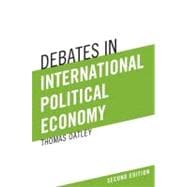
Note: Supplemental materials are not guaranteed with Rental or Used book purchases.
Purchase Benefits
What is included with this book?
Thomas Oatley is Associate Professor of Political Science at the University of North Carolina at Chapel Hill.
| Preface | p. xi |
| The Liberal International Order | p. 1 |
| Geopolitical Change Threatens the Liberal Order v. The Liberal Order Remains Robust | p. 3 |
| ôRevisiting the Future: Geopolitical Effects of the Financial Crisisö | |
| ôThe Liberal International Order and Its Discontentsö | |
| International Trade | p. 29 |
| Trade Deficits Reduce Total Jobs v. Trade Deficits Produce Different Jobs | p. 32 |
| ôThe China Trade Tollö | |
| ôThe Employment Rationale for Trade Protectionö | |
| Retrain Workers v. Redistribute Income | p. 53 |
| ôStrengthening Trade Adjustment Assistanceö | |
| ôA New Deal for Globalizationö | |
| Migration Brings Economic Gains v. Migration Reduces Cultural Cohesion | p. 76 |
| ôThe Case for Immigrationö | |
| ôToo Diverse?ö | |
| Free Trade Agreements are Stepping-Stones v. Free Trade Agreements are Stumbling Blocks | p. 95 |
| ôFree-Trade Agreements: Steppingstones to a More Open Worldö | |
| ôWhy PTAs Are a Pox on the World Trading Systemö | |
| Restrict Trade to Reduce Greenhouse Gases v. Don't Restrict Trade to Support Climate Change Goals | p. 122 |
| ôAddressing the Leakage/Competitiveness Issue in Climate Change Policy Proposals | |
| ôInternational Trade Law and the Economics of Climate Policy: Evaluating the Legality and Effectiveness of Proposals to Address Competitiveness and Leakage Concernsö | |
| Multinational Corporations | p. 157 |
| Sweatshop Regulation is Counterproductive v. Governments Must Regulate Sweatshops | p. 159 |
| ôIn Praise of Cheap Labor: Bad Jobs at Bad Wages Are Better than No Jobs at Allö | |
| ôWhy Economists Are Wrong about Sweatshops and the Antisweatshop Movementö | |
| The Multinational Corporation Race to the Bottom v. The Myth of the Multinational Corporation Race to the Bottom | p. 183 |
| ôMultinational Enterprises and the Prospects for Justiceö | |
| ôBottom Feedersö | |
| Sovereign Wealth Funds Threaten U.S. Interests v. Sovereign Wealth Funds Do Not Threaten U.S. Interests | p. 210 |
| ôSovereign Wealth Funds, Oil, and the New World Economic Orderö | |
| ôThe Rise of Sovereign Wealth Funds: Impacts on U.S. Foreign Policy and Economic Interestsö | |
| International Monetary Issues | p. 233 |
| Too Little Market Regulation Caused the Financial Crisis v. Too Much Government Intervention Caused the Financial Crisis | p. 235 |
| ôThe Anatomy of a Murder: Who Killed America's Economy?ö | |
| ôHow Did We Get into This Financial Mess?ö | |
| China Must Revalue to Correct Global Imbalances v. Chinese Revaluation Will Not Correct Global Imbalances | p. 253 |
| ôThe Dollar and the Renminbiö | |
| ôReconsidering Revaluation: The Wrong Approach to the U.S.-Chinese Trade Imbalanceö | |
| Development in the Global Economy | p. 271 |
| Trade Promotes Growth v. Trade Does Not Promote Growth | p. 273 |
| ôSpreading the Wealthö | |
| ôTrading in Illusionsö | |
| Foreign Aid Promotes Development v. Foreign Aid is Ineffective | p. 295 |
| ôEyes Wide Open: On the Targeted Use of Foreign Aidö | |
| ôThe Cartel of Good Intentionsö | |
| Microcredit Facilitates Development V. Microcredit Does Not Facilitate Development | p. 314 |
| ôPoverty Is a Threat to Peaceö | |
| ôThe Micromagic of Microcreditö | |
| The Future of Globalization | p. 331 |
| The Beijing Consensus Will Replace the Washington Consensus v. The Myth of the Beijing Consensus | p. 333 |
| ôRedefining Beijing Consensus: Ten Economic Principlesö | |
| ôThe Myth of the Beijing Consensusö | |
| The Consequence of Crisis: Fundamental Change or Essential Continuity? | p. 364 |
| ôGlobalization in Retreat: Further Geopolitical Consequences of the Financial Crisisö | |
| ôWhat ôChimericaö Hath Wroughtö | |
| Credits | p. 381 |
| Table of Contents provided by Ingram. All Rights Reserved. |
The New copy of this book will include any supplemental materials advertised. Please check the title of the book to determine if it should include any access cards, study guides, lab manuals, CDs, etc.
The Used, Rental and eBook copies of this book are not guaranteed to include any supplemental materials. Typically, only the book itself is included. This is true even if the title states it includes any access cards, study guides, lab manuals, CDs, etc.